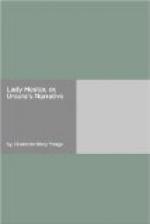To be farmers’ sisters where we had been the Earl’s daughters—well, I had much rather then that it had been somewhere else; but I saw it was best for Baby and still more so for Fulk, and clear little Jaquey held fast to me and to him, and so it was settled!
Our friends and relatives had much rather we had all emigrated. They did not know what to do with us, and would have been glad to have had us all out of sight for ever, “damaged goods shipped off to the colonies.” We felt this and it heartened us up to stay out of the spirit of opposition.
Old Aunt Amelia, who fussed and cried over us, and our two uncles, who gave us good advice by the yard! Alas! I fear we were equally ungrateful to them, both cold and impatient. No, we did not bear it really well, though they said we did. We had plenty of pride and self-respect, and that carried us on; but there was no submission, no notion of taking it religiously. I don’t mean that we did not go to church, and in the main try to do right. Any one more upright than my brother it would have been hard to find; but as to any notion that religious feeling could help us, and that our reverse might be blessed to us, that would have seemed a very strange language indeed!
And so we were hard, we would bear no sympathy but from one another, and even among ourselves we never gave way.
People admired us, I fancy, but were alienated and disappointed, and we were quite willing then to have it so.
CHAPTER IV. SKIMPING’S FARM.
Skimping’s Farm was the unlucky name of the place, and Fulk would allow of no modification—his resolution was to accept it all entirely. Now I love no spot on earth so well. It was very different then.
The farm-house lay on the slope of the hill, in the parish of Trevorsham, but with the park lying between it and the main village. The ground sloped sharply down to the little river, which, about two miles lower down, blends with the Avon, being, in fact, a creek out of Shinglebay. Beneath the house the stream is clear and rocky, but then comes a flat of salt marsh, excellent for cattle; and then, again, the river becomes tidal, and reaches at high water to the steep banks, sometimes covered with wood, sometimes with pasture or corn.
Then under the little promontory comes the hamlet of fisherfolk at Quay Trevor; and then the coast sweeps away to Shinglebay town, as anyone may see by the map.
Ours is an old farm, and had an orchard of old apple-trees sloping down to the river—as also did the home field, only divided by a low stone wall from the little strip of flower-garden before the house, which in those days had nothing in it but two tamarisks, a tea-tree, and a rose with lovely buds and flowers that always had green hearts.




